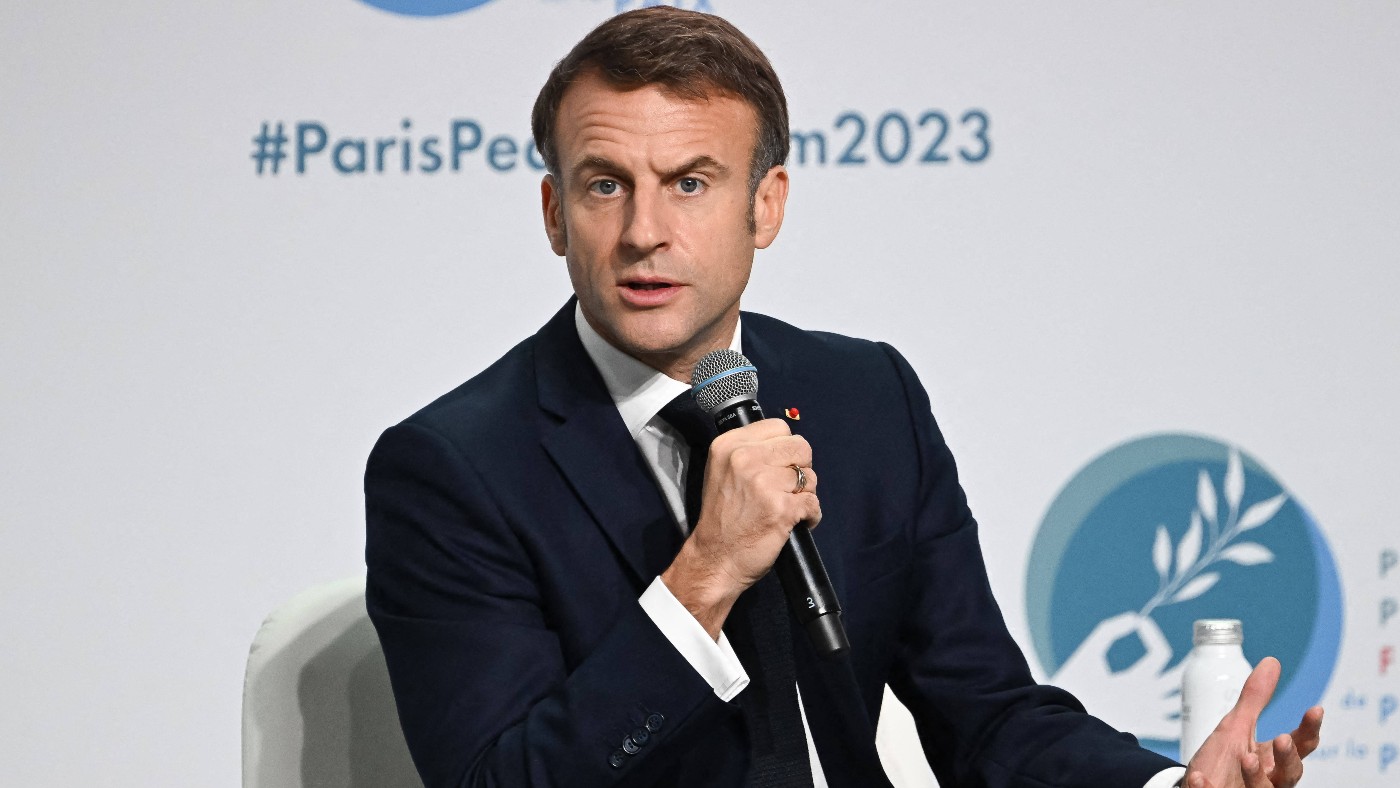Ils versus ielles: the battle over the French language
President Macron has decided to wade in over the fight to make French more inclusive

A free daily email with the biggest news stories of the day – and the best features from TheWeek.com
You are now subscribed
Your newsletter sign-up was successful
Emmanuel Macron is "a great lover" of traditional French, the language of Molière, said Die Welt (Berlin).
He often sprinkles his conversation with quaint terms like croquignolesque (ridiculous) or gallimatias (confused chatter). So it was entirely fitting that last week he should have been at Villers-Cotterêts castle, the royal hunting lodge where King Francis I signed an "Ordinance" in 1539 making French the nation's official language in place of Latin.
The president was there to inaugurate the most expensive cultural project of his term in office (aside from the restoration of Notre-Dame): a museum dedicated to the French language. The Cité internationale de la langue française, located in the newly renovated castle and costing €210m, will next year hold a summit aiming to unite every corner of the vast French-speaking world to mainland France.
The Week
Escape your echo chamber. Get the facts behind the news, plus analysis from multiple perspectives.

Sign up for The Week's Free Newsletters
From our morning news briefing to a weekly Good News Newsletter, get the best of The Week delivered directly to your inbox.
From our morning news briefing to a weekly Good News Newsletter, get the best of The Week delivered directly to your inbox.
'A gendered language'
But what no one had anticipated, said Marie Le Conte in The New European (London), was that Macron would use the occasion to wade into the ongoing culture war about making French more "inclusive". French is a gendered language, so if men and women do anything together they become ils (masculine) not elles (feminine). This and countless other linguistic sidelinings of the female have led feminists to demand a reshaping of French in official documents – ils to become ielles, for example, and sénateurs to become sénateur.rice.s. However, in the senate, the French parliament's largely conservative upper house, those self-same sénateur.rice.s, deeply opposed to such gender inclusive terms, have voted in favour of a bill banning their use in job adverts, official regulations and other government documents.
And Macron has backed them, said Julie Neveux in Libération (Paris). "We shouldn't give in to the zeitgeist", he insisted in his speech: in French "the masculine is neutral" and doesn't need to be altered. Really, Mr President? When someone says, in French, "the surgeons have entered the room", the masculine ending makes you inevitably think they're men. It needs changing.
'Rash of inclusive writing'
Global warming, turmoil in the Middle East: it seems odd for our politicians to be making French vocabulary their priority, said Samuel Petit in Le Télégramme (Morlaix). Still, they have a point. The rash of inclusive writing in official communiqués is like "chickenpox on the faces of young children": it scars public discourse. Our language is beautiful and we should respect it.
Let's not kid ourselves, said Roman Bucheli in Neue Zürcher Zeitung (Zurich): Macron's intervention was a ploy. He knows the bill is unlikely to be enacted: he's just seeking applause from the Right. It's hard to deny that the linguistic novelties proposed by activists often border on the ridiculous, said Christophe Lucet in Sud Ouest (Bordeaux). But the shape a language takes is governed by those who speak it, not by campaigners or the state. Fear not; French as we know it will endure.
A free daily email with the biggest news stories of the day – and the best features from TheWeek.com
-
 Political cartoons for February 16
Political cartoons for February 16Cartoons Monday’s political cartoons include President's Day, a valentine from the Epstein files, and more
-
 Regent Hong Kong: a tranquil haven with a prime waterfront spot
Regent Hong Kong: a tranquil haven with a prime waterfront spotThe Week Recommends The trendy hotel recently underwent an extensive two-year revamp
-
 The problem with diagnosing profound autism
The problem with diagnosing profound autismThe Explainer Experts are reconsidering the idea of autism as a spectrum, which could impact diagnoses and policy making for the condition
-
 Greenland’s capital becomes ground zero for the country’s diplomatic straits
Greenland’s capital becomes ground zero for the country’s diplomatic straitsIN THE SPOTLIGHT A flurry of new consular activity in Nuuk shows how important Greenland has become to Europeans’ anxiety about American imperialism
-
 The fall of the generals: China’s military purge
The fall of the generals: China’s military purgeIn the Spotlight Xi Jinping’s extraordinary removal of senior general proves that no-one is safe from anti-corruption drive that has investigated millions
-
 Epstein files topple law CEO, roil UK government
Epstein files topple law CEO, roil UK governmentSpeed Read Peter Mandelson, Britain’s former ambassador to the US, is caught up in the scandal
-
 Iran and US prepare to meet after skirmishes
Iran and US prepare to meet after skirmishesSpeed Read The incident comes amid heightened tensions in the Middle East
-
 Syria’s Kurds: abandoned by their US ally
Syria’s Kurds: abandoned by their US allyTalking Point Ahmed al-Sharaa’s lightning offensive against Syrian Kurdistan belies his promise to respect the country’s ethnic minorities
-
 Israel retrieves final hostage’s body from Gaza
Israel retrieves final hostage’s body from GazaSpeed Read The 24-year-old police officer was killed during the initial Hamas attack
-
 China’s Xi targets top general in growing purge
China’s Xi targets top general in growing purgeSpeed Read Zhang Youxia is being investigated over ‘grave violations’ of the law
-
 Panama and Canada are negotiating over a crucial copper mine
Panama and Canada are negotiating over a crucial copper mineIn the Spotlight Panama is set to make a final decision on the mine this summer